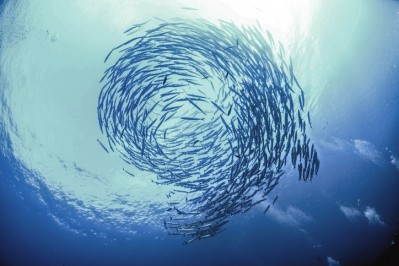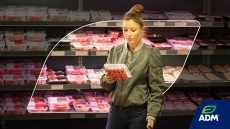‘Sea change can happen’: Plant-based pork major expands into ‘next big protein’ seafood

Today, on the occasion of World Oceans Day, OmniFoods founder and CEO David Yeung announced the company’s foray into plant-based seafood.
The new line of six SKUs, ranging from vegan tuna, to salmon and crab alternatives, aligns with OmniFoods and its parent organisation Green Monday’s objectives, said Yeung at the launch event: ‘To make change happen, one meal at a time’.
“Not everyone has to be vegan, not everyone needs to give up meat and seafood forever. Changes don’t happen that way. But we can all make that baby step, and if we make that baby step together, sea change can happen.”
‘The ocean will be fishless’
OmniFoods’ decision to expand into alt seafood stems from unsustainable practices within the fishing industry, combined with an insatiable appetite for fish, explained Yeung.
Seventy years ago, the global population consumed around 20 million tonnes of seafood. Today, that figure has increased to 180 million tonnes. “Global seafood consumption has exploded nine-fold in just 70 years, and that will continue to go up.”
The ocean cannot endlessly supply food for human consumption. Within these last 70 years, 90% of the world’s large predatory fish has been ‘wiped out’, he told delegates. “We are not talking about dropping supply, we are talking about extinction.”
Further, scientific reports predict that at some point between 2048 and 2068, the ocean’s fish stocks will be completely depleted. “The ocean will be fishless.”
The ocean does more than provide food for human consumption. Its health is crucial in combatting climate change, we were told. Essentially, damaging the ocean is directly accelerating global warming.
“A lot of people don’t realise that the biggest carbon sink on earth is not the Amazon…but actually the biggest carbon sink in the world is the ocean. Twenty-five perfect of CO₂ is offset by the ocean,” said OmniFoods’ CEO. “And depending on which study [you reference], 50-70% of the oxygen we breathe is from the ocean. Without the ocean, we don’t survive.”
Focus on Asia
Hong Kong-based OmniFoods is particularly interested in seafood alternatives given local consumption habits. “Of all the different regions in the world, Asia is the biggest consumer of seafood,” Yeung stressed.
Per capita, Hong Kong has the highest seafood consumption in the world – behind Iceland and the Maldives – representing around 3.5 times the global average of 20kg per year.
Having first focused on fake pork – the most widely consumed meat in Asia, and indeed, the world – OmniFoods Is now turning its hand to seafood. “Being headquartered in Asia, besides pork, it is only natural for us to think: What is the next big protein item that has been missed out?”
From a business perspective, vegan seafood represents white space, taking just 0.8% of the plant-based market in the US – and much less in other geographies. “That is the reason why today, on World Oceans Day – three years after we launched OmniPork – it is going to be Omni Seafood.”
The Seafood Series
The new range, which took 12-18 months to develop, comprises six new SKUs: the Classic Fillet, Golden Fillet, Ocean Burger, OmniTuna, Crab Cake and a salmon alternative.
The Omni Classic Fillet, for example, contains 302mg Omega-3 ALA, 11.1g protein per 100g serving, zero cholesterol and is low in saturated fat. The SKU is made from a blend of non-GMO soy, pea, and rice proteins, as well as non-GMO expeller-pressed canola oil.
The fish alternatives can be pan-fried, cooked, baked, deep-fried and roasted from frozen. Recipe ideas include a ‘homey dish fish with black bean sauce’, a ‘Sichuanese sour and spicy fish’, or a ‘Japanese miso-glazed fish’.
The OmniTuna SKU is similarly cholesterol -free and low in saturated fat. It contains 12g protein, 400g Omega-3 ALA and 130mg Omega-3 DHA. Its main ingredients are soy, wheat, canola oil and algae oil. OmniTuna represents OmniFoods’ first ambient product.
For Yeung, a big part of these products’ appeal is their versatility. “You can use them for western cooking applications, Asian oriental cooking applications, Thai, Japanese, Korean. You name it. The idea is what we set out: to be ‘omni’ – something that can be designed for all cuisines.”
The new range will roll-out into Hong Kong restaurants this month, with plans for retail and overseas expansion later this year.



























